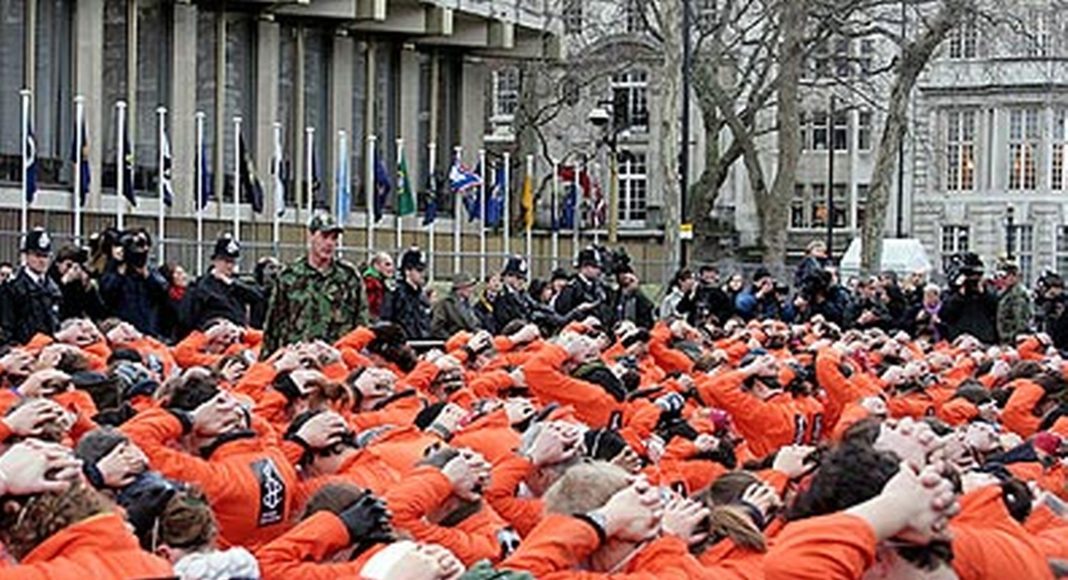A Guantanamo Bay detainee who has claimed asylum in Uruguay has been on hunger strike for several weeks because his transfer is continually being postponed.
Abu Wa’el Dhiab has been force fed during this time. His lawyers are appealing to a federal tribunal in Washington DC to halt the procedure.
Abu Wa’el Dhiab was promised refuge in Uruguay in May 2014 after being held without charge at Guantanamo Bay for 12 years.
 The current Uruguayan President, José ‘Pepe’ Mujica has called the Guantanamo Bay detention centre a “human disgrace”, and accepted the transfer of six prisoners from Guantanamo Bay to Uruguay, earlier in 2014.
The current Uruguayan President, José ‘Pepe’ Mujica has called the Guantanamo Bay detention centre a “human disgrace”, and accepted the transfer of six prisoners from Guantanamo Bay to Uruguay, earlier in 2014.
He called for the transfer to be postponed when it became a controversial topic in the current election to choose his successor.
In the first round, held on 26 October 2014, Tabaré Vázquez of Mujica’s Broad Front coalition earned 44-46% of votes, while Luis Lacalle Pou of the National Party gathered 35% of votes.
Since none of the candidates in the first round won more than 50% of the votes, these two face a runoff election on 30 November 2014.
Lacalle Pou has attacked the Mujica government’s decision to accept prisoners from Guanatanamo.: “Stay calm, the Guantanamo prisoners will not arrive to Uruguay”, he has promised on the election trail.
Lacalle has won support for his stance. A recent opinion poll by the consultancy Cifra found that some 58% of Uruguayans were against granting refugee status to these prisoners in October 2014.
Mujica’s response to the rejection of the detainees was: “ Let me ask you one question. Once you have found out that there are about 200 guys who have been falsely accused and treated like trash, and you can do something about it that others can’t, you won’t because of electoral contradictions?”
In August 2014, a Uruguayan delegation went to Guantanamo to interview the six prisoners. Two of them were guaranteed jobs in Uruguay; the rest are to be assisted with health and education services. The United Nations High Commissioner for Refugees (UNHCR) will provide them with a home.
The Guantanamo detainees have committed themselves to living two years in Uruguay, together with their families, who will be identified and transferred by the International Red Cross.
Under President Mujica, Uruguay has also become the first country in the region to implement a resettlement program for Syrians seeking asylum.
On 9th October 2014, the first five Syrian families arrived in Montevideo. The group of 42 people is mostly composed of women and children.
The program aims to help the families obtain a job and a home. “It’s a resettlement program, not a migration one. They can go back to Syria whenever they want,” claimed Javier Miranda, the Secretary for Human Rights in Uruguay.
The program is set to expand to 80 additional refugees, who wil be received in Uruguay by February 2015. Javier Miranda claims thats “Uruguay is trying to tell others ‘do something, it’s possible”.
This liberal attitude in foreign affairs has been matched in internal politics under President Mujica and his left-wing Broad Front government. During his mandate, laws on abortion have been relaxed, and in 2013 Uruguay became the first country in the world to legalise and control the marijuana trade.
These policies, as well as the attitude to welcoming detainees and refugees from distant conflicts, are being challenged in the current elections.
The Broad Front presidential candidate Tabare Vázquez has pledged to continue with similar efforts, but Lacalle has promised to repeal certain laws, among them the one permitting the production sales of marijuana: “The articles concerning self-cultivation and smoking clubs will be maintained, but I will derogate all the rest”, he said.
Tabare Vazquez remains the clear frontrunner for the second round.
.

